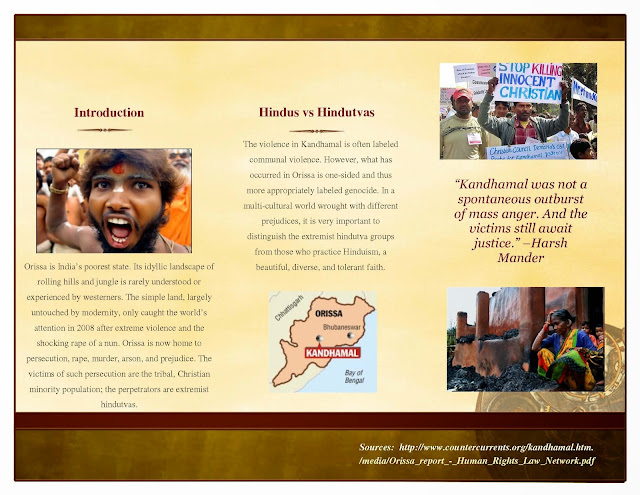The book is an account of the vicious persecution of a religious minority in a remote part of India, and we're focusing on a section that recounts the gang-rape of a young Hindu girl, by Hindu extremists, because her uncle is a Christian and will not convert to Hinduism. It's very disturbing; you can read a brief news article on the situation here, in the Guardian.
In our presentation we used several tactics to engage our fellow students in our literary activism. We created a 10-minute mini-documentary in which we discuss the situation with other students who agreed to be interviewed. Our documentary isn't available for public viewing, but we also used this video of photos of Kandhamal as a background visual while we introduced our project to the class, and the images are stunning, although I do suggest muting the music that plays in the background. :) We asked the interviewees questions about journalistic objectivity, religious persecution, what kind of challenges might a child face in a situation like this, and what, if anything, Canadians/students could do to help subaltnerized groups in other places.
We have a Twitter account, where we use the hashtag #491voices, and where we've engaged with other students, as well as Akkara, the author of our text. As our project focuses on a voiceless group, the subaltern children, using Twitter as a 'voice' seemed very appropriate. We also created a brochure for our classmates to take away with them, so that they can research the topic further if they so choose.
Our project isn't over yet - we still have to collaborate on writing a paper, but the presentation was the more stressful part! Now that we've spent so much time talking and thinking about the issues surrounding our text, I feel like I could just sit down and start writing. Hopefully I didn't just use up all my inspiration on this blog post... :)
And, last but not least, we provided a bit of fusion comfort food to go along with this heavy topic. I had a couple of requests for the recipe, so I thought I'd post it here. Nan Khatai seems to be a recipe that varies depending on who's making it; I used nutmeg, vanilla, and almonds in ours, but I also saw versions with cardamom and pistachios instead.
Nan Khatai or “Indian Shortbread”
Makes 20-25 cookies
Preheat oven to 325º
Ingredients:
2 cups flour
½ tsp nutmeg
½ tsp baking soda
4 tblsp finely chopped almonds
1 cup melted butter
1 cup icing sugar
½ tsp vanilla
milk
Almonds for garnishing
Instructions:
With a fork or whisk mix flour, nutmeg, baking soda, and almonds in a large bowl and set aside.
In a separate, deep bowl mix melted butter and icing sugar together and beat with an electric mixer for 5 minutes. Add vanilla and stir.
Slowly add wet ingredients to dry, mixing constantly, then add milk by tablespoons until the dough is of a shortbread consistency. *
Cover dough and let stand for half an hour.
Shape tablespoons of dough into round, flat cookies and garnish with an almond.
Bake on greased cookie sheet for 10-12 minutes, until the bottoms of the cookies are just golden.
The flavour seems to improve over several days, if they last that long!
The flavour seems to improve over several days, if they last that long!
* In dry, high-altitude Calgary I added about 1/8 to 1/4 cup of milk
Inspired by: http://www.jeyashriskitchen.com/2013/10/nan-khatai-recipes-diwali-sweets.html

